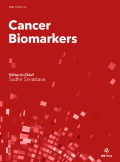Authors: Murakami, Kaoru | Kamat, Ashish M. | Dai, Yunfeng | Pagano, Ian | Chen, Runpu | Sun, Yijun | Gupta, Amit | Goodison, Steve | Rosser, Charles J. | Furuya, Hideki
Article Type:
Research Article
Abstract:
BACKGROUND: Intravesical Bacillus Calmette-Guerin (BCG), a live attenuated tuberculosis vaccine that acts as a non-specific immune system stimulant, is the most effective adjuvant treatment for patients with intermediate or high-risk non-muscle-invasive bladder cancer (NMIBC). However, to date, there are no reliable tests that are predictive of BCG treatment response. In this study, we evaluated the performance of Oncuria TM , a bladder cancer detection test, to predict response to intravesical BCG. METHODS: Oncuria TM data was evaluated in voided urine samples obtained from a prospectively collected cohort of 64
…subjects with intermediate or high risk NMIBC prior to treatment with intravesical BCG. The Oncuria TM test, which measures 10 cancer-associated biomarkers was performed in an independent clinical laboratory. The ability of the test to identify those patients in whom BCG is ineffective against tumor recurrence was tested. Predictive models were derived using supervised learning and cross-validation analyses. Model performance was assessed using ROC curves. RESULTS: Pre-treatment urinary concentrations of MMP9, VEGFA, CA9, SDC1, PAI1, APOE, A1AT, ANG and MMP10 were increased in patients who developed disease recurrence. A combinatorial predictive model of treatment outcome achieved an AUROC 0.89 [95% CI: 0.80–0.99], outperforming any single biomarker, with a test sensitivity of 81.8% and a specificity of 84.9%. Hazard ratio analysis revealed that patients with higher urinary levels of ANG, CA9 and MMP10 had a significantly higher risk of disease recurrence. CONCLUSIONS: Monitoring the urinary levels of a cancer-associated biomarker panel enabled the discrimination of patients who did not respond to intravesical BCG therapy. With further study, the multiplex Oncuria TM test may be applicable for the clinical evaluation of bladder cancer patients considering intravesical BCG treatment.
Show more
Keywords: Biomarkers, bladder cancer, multiplex, protein, BCG
DOI: 10.3233/CBM-210221
Citation: Cancer Biomarkers,
vol. 33, no. 1, pp. 151-157, 2022





